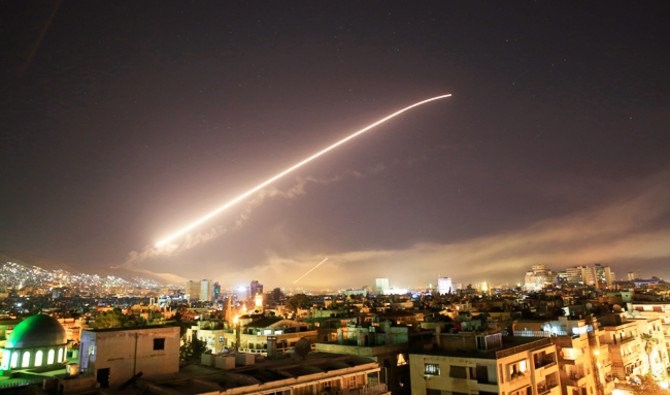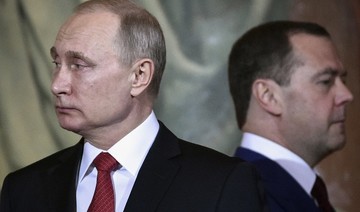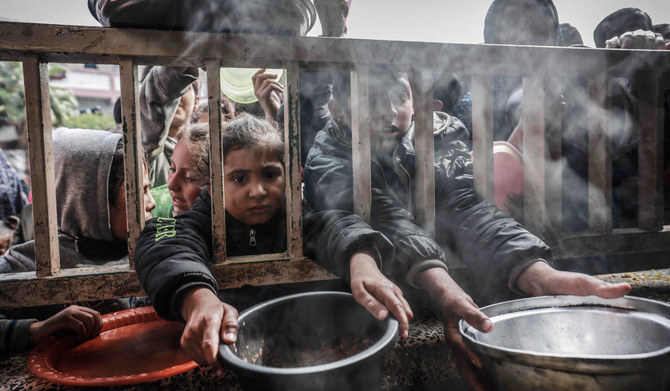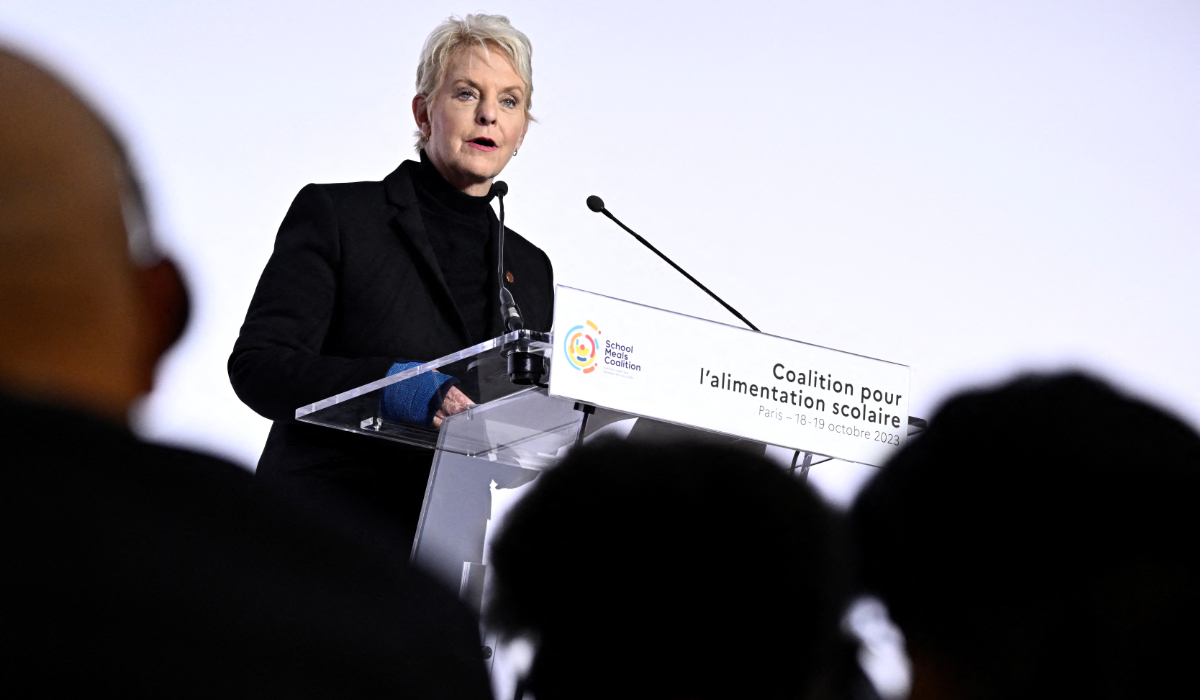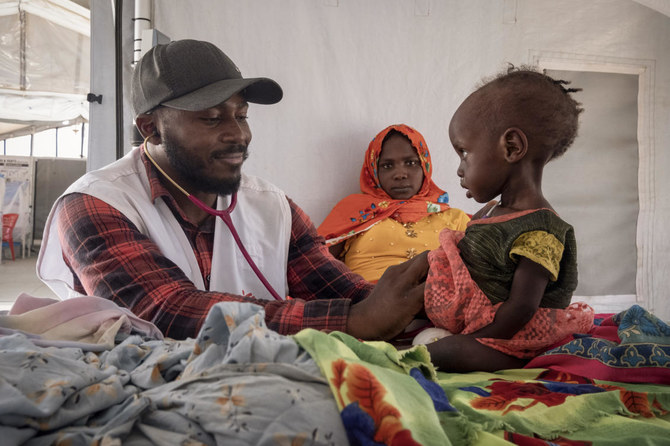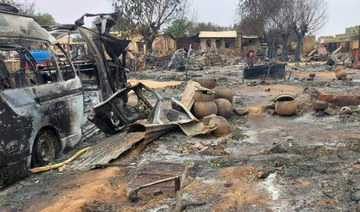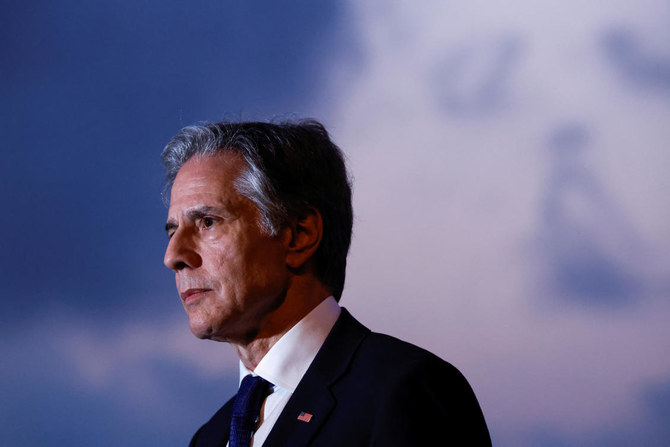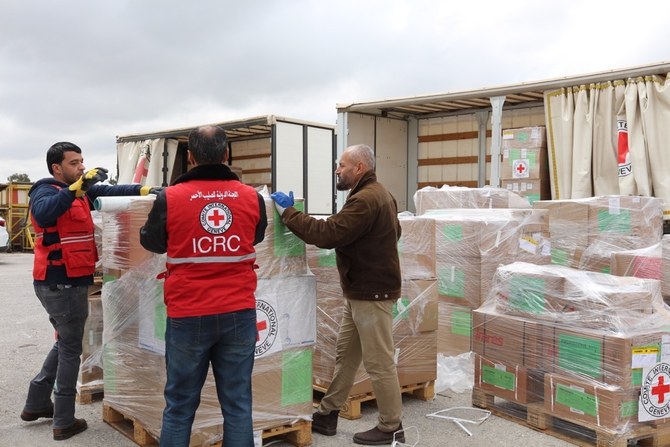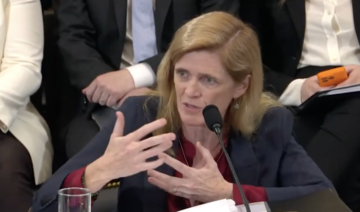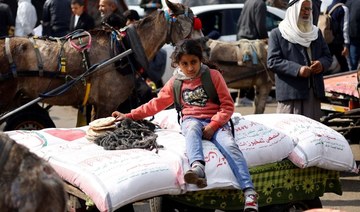DUBAI: The United States, United Kingdom and France launched missile strikes on Syrian regime positions and bases early Saturday morning in response to the chemical weapons attack conducted by Syrian President Bashar Assad on Douma.
Regime allies condemned the attack while those in favor of the strikes called them an “appropriate response.”
United States
President Donald Trump on Saturday praised the pre-dawn strikes against Syria's regime carried out jointly by the US, Britain and France, saying they "could not have had a better result."
"A perfectly executed strike last night. Thank you to France and the United Kingdom for their wisdom and the power of their fine Military," Trump tweeted.
"Could not have had a better result. Mission Accomplished!"
The Pentagon said on Saturday that US strikes in Syria overnight had successfully hit every target and were aimed to deliver an unambiguous signal to the Syrian government and deter the future use of chemical weapons.
The strikes significantly crippled Syrian President Bashar Al-Assad's ability to produce chemical weapons, officials told reporters at a briefing, and the Pentagon was not aware of any civilian casualties resulting from the strikes.
Lieutenant General Kenneth F. McKenzie said the strikes were precise, overwhelming and effective.
Though some of Syria's chemical weapons infrastructure was still left, "I think we've dealt them a severe blow," McKenzie said, adding it would set the program back for years.
Despite severely damaging the infrastructure with the strikes, McKenzie said the Pentagon would not rule out that the Assad government still had capability to use such weapons again.
"I would say there's still a residual element of the Syrian program that's out there," he said. "I'm not going to say that they're going to be unable to continue to conduct a chemical attack in the future. I suspect, however, they'll think long and hard about it."
France
France’s Foreign Minister Jean-Yves Le Drian said that the joint military operation in Syria was legitimate, limited and proportionate.
The French military on Saturday targeted Syria’s main chemicals research center as well as two other facilities, French Defense minister Florence Parly said, adding that Russia had been informed before the strikes were carried out.
The minister was speaking hours after President Emmanuel Macron ordered a military intervention in Syria alongside the United States and Britain in an attack on the chemical weapons arsenal of the country’s regime.
“We are not looking for confrontation and refuse any logic of escalation, that is the reason why we, with our allies, ensured the Russians were warned beforehand,” Parly told journalists in a short statement alongside Foreign minister Le Drian.
Parly also said cruise missiles had been fired by the French military.
UK
UK PM Theresa May said in a televised statement that "there is no practicable alternative to the use of force to degrade and deter the use of chemical weapons by the Syrian regime."
"This is not about intervening in a civil war. It is not about regime change."
"It is about a limited and targeted strike that does not further escalate tensions in the region and that does everything possible to prevent civilian casualties," she said.
May said "a significant body of information including intelligence" pointed to Syrian government responsibility for a suspected chemical attack in Douma last Saturday.
She said the strikes would "send a clear signal to anyone else who believes they can use chemical weapons with impunity".
"This is the first time as prime minister that I have had to take the decision to commit our armed forces in combat — and it is not a decision I have taken lightly.
"I have done so because I judge this action to be in Britain's national interest," she added.
In her comments, May also alluded to a nerve agent attack in Britain last month on a former Russian spy and his daughter.
"We cannot allow the use of chemical weapons to become normalized — within Syria, on the streets of the UK, or anywhere else in our world," she said.
Saudi Arabia
Saudi Arabia holds Assad’s regime responsible for Syria’s military attacks, according to a statement read out by the Kingdom’s Ministry of Foreign Affairs.
“The raids on the regime's sites came in response to chemical use, and we fully support military operations against military targets in Syria,” the statement read.
The statement continued by saying that “Saudi Arabia fully supports the strikes launched by the United States, France and Britain against Syria because they represent a response to the regime's crimes.”
The strikes were prompted by the “Syrian regime’s use of chemical weapons against innocent civilians, including women and children,” reported the Saudi Press Agency.
The Saudi Ambassador to the US Prince Khaled bin Salman said that Saudi Arabia supports the accurate strikes against the Iranian-backed Assad regime.
Ambassador Prince Khaled bin Salman also said that the Kingdom hopes that the strikes will deter the regime from using chemical weapons. The strikes send a message to Assad, Iran, and its sectarian militias, he added.
Israel
Punitive US-led strikes on Syria are justified because of the “murderous actions” carried out by the Damascus government, an Israeli official said.
“Last year (US) President Donald Trump said that the use of chemical weapons would violate a red line. This night, under America’s guidance, the United States, France and Britain acted accordingly (because) Syria continues to carry out its murderous actions,” the official, who declined to be identified, said.
Canada
Canadian Prime Minister Justin has expressed his support for the punitive strikes carried out against Assad's regime.
"Canada supports the decision by the United States, the United Kingdom, and France to take action to degrade the Assad regime's ability to launch chemical weapons attacks against its own people," Trudeau said in a statement Friday.
The strikes came after an alleged chemical weapons attack on the rebel-held town of Douma that killed more than 40 people, according to medics and rescuers.
General Joe Dunford, chairman of the Joint Chiefs of Staff, said the strikes hit targets related to Syria's chemical weapons program — a scientific research center near Damascus, a weapons storage facility west of Homs, and a third location nearby containing a command post and an equipment storage facility.
Turkey
The Turkish foreign ministry welcomed US, UK and France strikes on Syria as an “appropriate response.”
"We see the operation carried out against the Syrian government by the United States, the United Kingdom and France... as an appropriate response," the source said.
Ankara said the attacks, with weapons of mass destruction, including chemical weapons, that indiscriminately target civilians, "constitute crimes against humanity" and they should not go unpunished.
"The Syrian regime, which has been tyrannizing its own people for more than seven years, be it with conventional or chemical weapons, has a proven track record of crimes against humanity and war crimes," the ministry said.
"The conscience of the international community is in no doubt about that."
NATO
The head of NATO expressed his support for the Western strikes.
“I support the actions taken by the United States, the United Kingdom and France... This will reduce the regime’s ability to further attack the people of Syria with chemical weapons,” Secretary General Jens Stoltenberg said in a statement.
European Union
European Council President Donald Tusk said Saturday the European Union stood by the United States, France and Britain over their air strikes against the regime in Syria for alleged chemical attacks.
"Strikes by US, France and UK make it clear that Syrian regime together with Russia and Iran cannot continue this human tragedy, at least not without cost. The EU will stand with our allies on the side of justice," Tusk said in a Twitter message.
EU Commission chief Jean-Claude Juncker said this was not the first time that Damascus had used chemical weapons against civilians "but it must be the last.
"The international community has the responsibility to identify and hold accountable those responsible of any attack with chemical weapons," Juncker said in a statement.
"As it enters its 8th year of conflict, Syria desperately needs a lasting ceasefire respected by all parties that paves the way for achieving a negotiated political solution through the United Nations-led Geneva process, to bring peace to the country once and for all."
United Nations
"I urge all member states to show restraint in these dangerous circumstances and to avoid any acts that could escalate the situation and worsen the suffering of the Syrian people," said UN Secretary-General Antonio Guterres in a statement.
He urged the UN Security Council to agree on establishing an inquiry that would identify the perpetrators of chemical attacks.
Russia this week vetoed a US proposal to set up such a panel on the suspected attack in Syria.
Germany
German Chancellor Angela Merkel on Saturday backed air strikes by the United States, France and Britain as a "necessary and appropriate" action to warn Syria against further use of chemical weapons.
"We support the fact that our American, British and French allies have taken responsibility in this way as permanent members of the UN Security Council," Merkel said. Merkel this week had said Germany would not take part in any military action against Syria.
The Netherlands
Dutch Prime Minister Mark Rutte has expressed his understanding of the military strikes by the United States, Britain and France against facilities in Syria.
Mark Rutte said in a statement on Saturday that the military operation is proportionate and appropriate under the current circumstances, noting that the Dutch government believes that it is likely that the Syrian regime used poison gas against its citizens in Douma.
“The use of chemical weapons is a grave crime and a flagrant violation of international law,” he said, stressing that the international community cannot accept that.
Amnesty International
"All precautions must be taken to minimize harm to civilians in any military action," Raed Jarrar, advocacy director for the Middle East and North Africa at rights watchdog Amnesty International USA said in a statement.
Syrian Rebels
A prominent Syrian rebel faction said on Saturday that Western strikes against government positions were a "farce" as long as Assad remained in power.
"Punishing the instrument of the crime while keeping the criminal — a farce," wrote Mohammad Alloush, a key member of the Jaish al-Islam rebel group.
Russia
The Kremlin on Saturday condemned Western air strikes on Syria where its armed forces are backing Assad.
"Russia severely condemns the attack on Syria where Russian military are helping the lawful government in the fight with terrorism," the Kremlin said in a statement, its first reaction to the strikes.
Russian President Putin says strike on Syria by US and its allies will exacerbate humanitarian catastrophe in Syria.
“Again, we are being threatened,” Russia’s ambassador to the US, Anatoly Antonov, said in a statement.
“We warned that such actions will not be left without consequences. All responsibility for them rests with Washington, London and Paris.”
“Insulting the President of Russia is unacceptable and inadmissible,” added the envoy, after President Donald Trump directly called out his Russian counterpart Vladimir Putin over his support for the Assad regime.
The Russian Foreign Minister Sergei Lavrov Lavrov said at a briefing on Saturday that the actions of Western countries in Syria are unacceptable and lawless.
Russia has also asked the UN Security Council to condemn the "aggression" against Syria from military strikes carried out by the United States, Britain and France, according to a draft resolution seen by AFP.
Russia circulated the measure ahead of a Security Council meeting to discuss the military operation by the three allies in response to an alleged chemical weapons attack.
Iran
Iran’s foreign ministry in a statement that “Undoubtedly, the United States and its allies, which took military action against Syria despite the absence of any proven evidence ... will assume the responsibility for the regional and trans-regional consequences of this adventurism.”
Tehran officials have said Western powers are using last week’s alleged chemical attack on a rebel-held stronghold as an excuse to undermine the Syrian government’s recent successes on the battlefield.
“This aggression is designed to compensate for the defeat of the terrorists” in Eastern Ghouta, an area recently recaptured by Syrian government forces, Iran’s foreign ministry said.
Iran's Supreme Leader Ayatollah Ali Khamenei said an attack on Syria by the United States, France and Britain on Saturday was a crime and would not achieve any gains.
"US, allies will not gain any achievements from crimes in Syria. Attacking Syria is a crime. US president, UK prime minister and the president of France are criminals," Khamenei said in a speech cited by Iranian TV.
Syria
Syrian President Bashar Assad said Western strikes on government military installations Saturday only made him more keen to fight back against his opponents, in comments published by his office.
“This aggression will only make Syria and its people more determined to keep fighting and crushing terrorism in every inch of the country,” Assad, in his first reaction to the strikes, told his Iranian counterpart Hassan Rouhani.
The Western attack will not have any impact on the Syrian army’s resolve to press the fight against militants and restore control of the entire country, the Syrian foreign ministry said.
“The barbaric aggression ... will not affect in any way the determination and insistence of the Syrian people and their heroic armed forces,” state news agency SANA cited an official source in the ministry as saying.
“This aggression will only lead to inflaming tensions in the world” and threatens international security, it added.
A statement carried by state news agency SANA said the strikes aimed to block a probe by the OPCW global chemical watchdog into an alleged gas attack outside Damascus.
The attack “aims at hindering the mission’s work and preempting its results”, said the statement quoting a source at the Syrian foreign ministry.
Hezbollah
Lebanese movement Hezbollah sharply condemned the barrage of strikes, saying they would not achieve their objectives.
"America's war against Syria, and against the region's peoples and resistance movement, will not achieve its aims," the group said in a statement published on its War Media Channel.
Iran's Revolutionary Guard
An official in Iran's Revolutionary Guards said that the fallout from US-led attacks on Syria will be at Washington's expense.
"With this attack...the situation will become more complex, and this will surely be at the expense of the United States, which will be responsible for the aftermath of upcoming regional events that will certainly not be in their interest," Yadollah Javani, the Guards' deputy head for political affairs, told Fars news agency.
Iraq
Air strikes carried out by the United States, France and Britain against Syrian military targets could give terrorism an opportunity to expand in the region, the Iraqi foreign ministry said on Saturday.
The air strikes marked a "a very dangerous development", the ministry said in statement.
"Such action could have dangerous consequences, threatening the security and stability of the region and giving terrorism another opportunity to expand after it was ousted from Iraq and forced into Syria to retreat to a large extent," it said.




